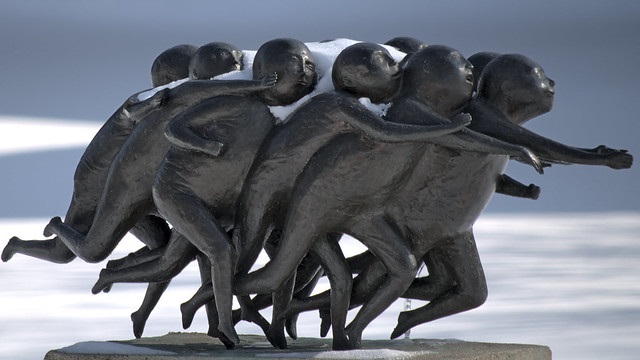“But first.” Such an expedient and automatic answer, isn’t it? One that we utter without thinking, even, and to so many requests for our time and our attention. Our everyday lives are full of “but firsts” and so I began to consider just how much I might have missed over the years because I have uttered these words, often without even thinking — “Sure, but first, l need to finish this article.” “That sounds great! But first, I have to grade five more sermons.” “I would love to! But first, let me just turn in this paper work” — putting off getting together with friends and family, spending time with my boys. Postponing priorities. Deferring important decisions. Delaying connection and joy and happiness. And, all of a sudden, you are of a certain age when you realize how much over the years, how many opportunities, may have passed you by, and it’s time to stop saying “but first” even if you think you have a really good reason for doing so.
We are in an “all of a sudden” moment in Luke’s Gospel — a time and place when “but first” will not do anymore. And why? Well, we know what Jerusalem means. We might have been able to get on board with the way of Jesus, navigating a few inconveniences here and there, but has it been that there is only so far we are willing to go? Perhaps with good intentions and good reasons, of course. That which prevents us from following Jesus is a rather long list, I suspect, and these days, seems to get longer every day. Especially when “follow me” is preceded by “Jesus set his face to go to Jerusalem.” All of a sudden, a few more excuses end up on the list.
That’s what this story tells us about ourselves.
This story invites us to consider our “but first” responses. It is reflection we need to do when it comes to our own lives before we ask the people sitting in our pews to ponder theirs. We are not exempt from admitting our “but firsts” even though we would like to assume that ordination gives us a pass. I imagine this could be hard work, Dear Working Preachers, and not just remembering those moments when we said “but first” before we finally answered the call to ministry.
I am also thinking of those times, perhaps lately, when Jesus says, “Follow me and preach that Jesus’ way will not accept against the inhumane treatment of refugee and immigrant children” and we say, “But first…” When Jesus says, “Follow me and preach against words or behavior that justify white supremacy” and we say, “But first…” When Jesus says, “Follow me and preach for the future of our earth” and we say, “But first…” When Jesus says, “Follow me and preach that my way means anti-racism, anti-sexism,” and we say, “But first…” When Jesus says, “On this last day of Pride Month, if you have not preached against the discrimination of LGBTQ+ persons and preach for their full rights as loved by God,” and we say, “But first…”
You get the idea. Our preaching is full of “But firsts,” stalling and suspending the urgent issues of what it means to be a Christian, how to interpret Scripture, how to talk about the meaning of Jesus’ ministry so as to “find the right time,” to “get a few things figured out first,” to “make sure our congregations can handle it.”
There are way more “but firsts” than we are willing to admit. We rationalize them as strategic, best practices, following protocol. We justify them as necessary decisions, just balancing budgets, or keeping denominational order.
It is no accident that “but first” comes up just as Jerusalem is in view. We need to know what’s at stake and we seem to need reminders of it frequently. Complicity is all too often attractive. Complacency is all too often the easier way.
A sermon on this text will ask, therefore, what are our “but, firsts” when it comes to following the way and ways of Jesus. It will be honest about how often “but first” comes before “of course.” It will tell the truth that we regularly respond “But first” instead of “I’m ready.”
But first, a sermon on this story will remember the promise of the prayer of the psalmist and hold it close to your heart, because it’s exactly what you need to let the “but firsts” go. “I keep the Lord always before me; because he is at my right hand, I shall not be moved. Therefore my heart is glad, and my soul rejoices; my body also rests secure. You show me the path of life. In your presence there is fullness of joy; in your right hand are pleasures forevermore” (Psalm 16).
Karoline

